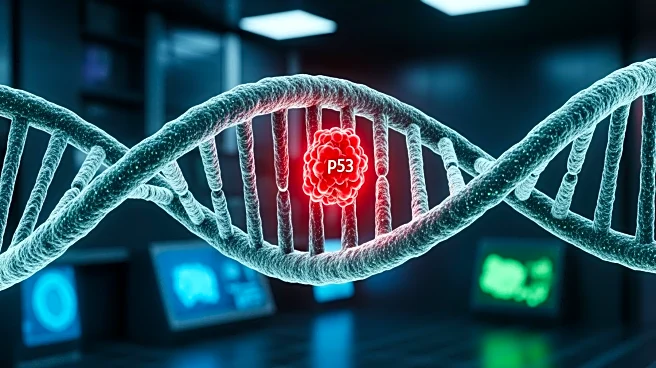What's Happening?
Recent oncogenomics research has focused on the genetic vulnerabilities of cancer cells, particularly those with TP53 mutations. A large-scale genomic study analyzed nearly 1,000 cancer cell lines to identify
synthetic lethal interactions with TP53-mutant cells. The study found that while no specific genetic dependencies were enriched in these cells, the abundance of mutant p53 protein itself presents a unique therapeutic target. Researchers have developed bifunctional molecules that can selectively kill cells with high levels of mutant p53 by linking a p53 binder with a cytotoxic agent. This approach leverages the overexpression of p53 in mutant cells to concentrate the cytotoxin, potentially offering a new treatment strategy for cancers with TP53 mutations.
Why It's Important?
The findings are significant as they offer a potential new avenue for cancer treatment, particularly for tumors with TP53 mutations, which are common in various cancers. By targeting the overabundance of mutant p53 protein, these bifunctional molecules could provide a more effective and selective treatment option, minimizing damage to healthy cells. This research could lead to the development of new cancer therapies that exploit specific genetic vulnerabilities, potentially improving outcomes for patients with TP53-mutant cancers. The approach also highlights the importance of precision medicine in oncology, where treatments are tailored based on the genetic profile of individual tumors.
What's Next?
Further research and clinical trials will be necessary to validate the efficacy and safety of these bifunctional molecules in humans. If successful, this could lead to the development of new drugs targeting TP53 mutations, offering hope for patients with limited treatment options. The study also opens the door for exploring similar strategies for other genetic mutations in cancer, potentially broadening the scope of precision oncology.
Beyond the Headlines
The research underscores the potential of oncogenomics to transform cancer treatment by identifying and exploiting specific genetic vulnerabilities. It also raises ethical considerations regarding access to such advanced therapies and the need for equitable distribution of new treatments. As the field advances, it will be crucial to address these issues to ensure that all patients can benefit from the latest scientific breakthroughs.










